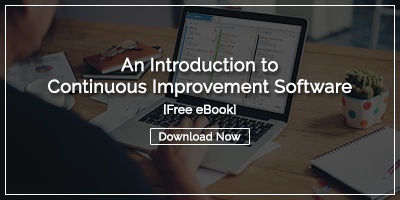 We are fortunate enough to have the opportunity to talk to lots of organizations that are thoughtfully considering how they can implement business improvement methodologies, tools, and cultures that get results. One of the things we like to share is how successful businesses have integrated Kaizen software into their improvement initiatives. Of course, this brings up a lot of questions. Here are some that we are asked most frequently.
We are fortunate enough to have the opportunity to talk to lots of organizations that are thoughtfully considering how they can implement business improvement methodologies, tools, and cultures that get results. One of the things we like to share is how successful businesses have integrated Kaizen software into their improvement initiatives. Of course, this brings up a lot of questions. Here are some that we are asked most frequently.
What is Kaizen?
Improvement veterans are more than familiar with this term, but it is new to those just becoming immersed in the practice of continuous improvement. Kaizen is a Japanese term that means “good change.” Kaizen refers to activities that continually improve processes and involve every employee from the executive team to front line workers. The idea of Kaizen as a fundamental business philosophy was first embraced by several Japanese manufacturing businesses after World War II. It has since been adopted by businesses of all types across the world.
What Does Kaizen Software Do?
Kaizen software provides the structure for continuous improvement. It serves as the organization’s hub for all active and completed improvement projects.
How Does it Work?
There are five essential features that make Kaizen software work. They include:
Opportunity Capture – Kaizen software is available to every employee and accessible from anywhere. It is the repository for all opportunities for improvement.
Workflow – Once an opportunity is identified the solution supports alerts and notifications to help keep forward momentum for the ideas that are destined to be implemented.
Cross-Functional Collaboration – Many projects that make processes better require input from people in multiple roles. Kaizen software is designed to make this kind of collaboration easy by providing a transparent view into the activities of all individuals and departments.
Measurement – Improvement activities should result in demonstrable benefits to the organization. Kaizen software collects the relevant data and provides support for analyzing the impact of improvement.
Knowledge Sharing – People become more engaged in Kaizen when they see positive results. The software is an important platform for making sure that success is broadcast far and wide.
Why is it important?
In addition to providing a platform to support and spread improvement efforts, Kaizen software also sends a powerful signal to the organization that leadership is committed to continuous improvement and willing to make the investment necessary to make it easy and successful for employees. It also collects tribal knowledge, making future improvement efforts easier. Finally, it is an important tool for proving the ROI of Kaizen.
How would it fit into my organization?
This is a great question with a different answer for every business. That’s why we offer a free, no-obligation consultation with one of our improvement experts. They’ll assess your current situation as it relates to improvement and make suggestions about whether Kaizen software might help, and if so, how to move forward.
While these are the most common questions we get about Kaizen software, they certainly aren’t the only good ones. Got more? Just let us know or leave a comment.



Add a Comment